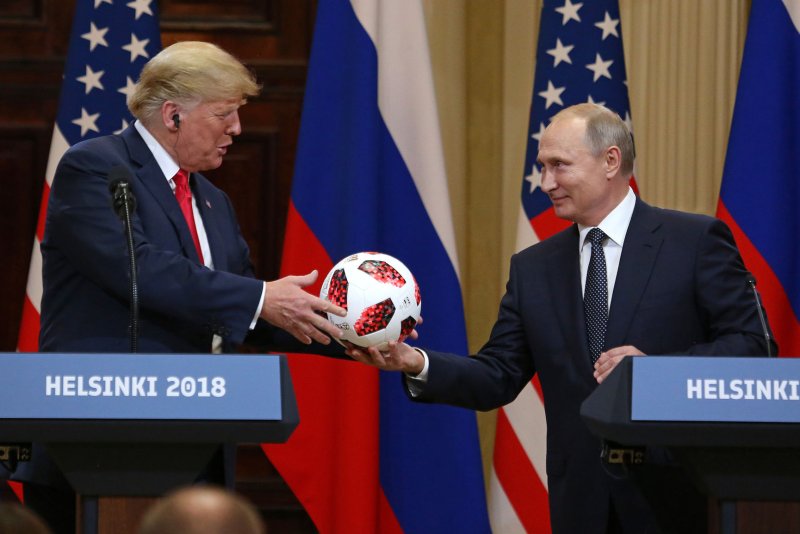1 of 2 | U.S. President Donald Trump (L) receives a soccer ball from Russian President Vladimir Putin during a joint press conference in Helsinki, Finland on Monday. Photo by David Silpa/UPI |
License Photo
July 19 (UPI) -- President Donald Trump has an unfortunate habit of making splashy, unsupported proclamations of foreign policy breakthroughs. The latest episode was his statement after his summit meeting with Russian President Vladimir Putin in Helsinki, Finland. After claiming that the relationship between the two countries "has never been worse than it is now," he quickly added, "that changed, as of about four hours ago."
The notion that such deeply troubled bilateral ties improved dramatically because of one brief meeting, however cordial, defies logic. The United States and Russia have faced bitter disputes on multiple issues, including policy toward Syria, NATO expansion, Moscow's annexation of Crimea and Russia's alleged interference in America's 2016 elections. Such disagreements and tensions will be resolved (if at all) only after lengthy, difficult negotiations.
Unfortunately, Trump seems to believe that entrenched policies can shift quickly with little more than determination and goodwill.
For example, following the recent NATO summit, he stated confidently that the European members had committed to making far more serious defense efforts and sharing a greater portion of the collective defense burden. Like his statement in Helsinki, that comment is premature at best and woefully naïve at worst.
Washington's NATO partners have made similar promises in the past, only to renege on them in subsequent years. Following the 2006 summit, members of the alliance pledged to devote a minimum of 2 percent of their annual gross domestic product to defense. They re-emphasized that commitment at the 2014 summit. Yet in 2017, other than the United States, only Britain, France, Greece, Poland and Estonia had met that target. The lackadaisical spending policies of the other members drew sharp rebukes from Barack Obama and his secretary of defense, Robert Gates.
Given that track record, it is decidedly premature for Trump to assume that this time it will be different. Granted, his criticisms of the allies were significantly sharper and angrier than those expressed by officials in earlier administrations, but only time will tell if the European governments are now more serious about their NATO commitments.
Trump also jumped to optimistic conclusions following his summit with North Korean dictator Kim Jong Un. Not only did he contend that the meeting had gone extremely well, he soon stated that North Korea no longer posed a nuclear threat.
His assumption about the latter point was utterly unwarranted, but Trump did have reason to be pleased about the results of the Singapore summit. The atmosphere was cordial, in sharp contrast to the usual adversarial relationship between the two countries, punctuated by implied or explicit threats from both parties. And instead of such sneering, knee-jerk condemnation from those who see the summit as a public relations win for Kim, Trump deserves credit for his willingness to change a decades-old policy toward Pyongyang that clearly was not working. The summit may turn out to be the first step in defusing the dangerous tensions on the Korean Peninsula. Conceivably, the initial thaw might even lead to a long-term rapprochement similar to the transformation of the U.S.-China relationship after President Richard Nixon's 1972 trip to China.
It is at least encouraging that in the lead-up to the Trump-Kim talks, North Korea ceased conducting nuclear or ballistic missile tests. Moreover, that de facto moratorium continues. The usual vitriolic, anti-U.S. propaganda emanating from Pyongyang also has ceased, at least for the moment. Cautious optimism about such developments is warranted.
But it is far too soon to assume an era of friendly U.S.-North Korean relations is at hand. It is especially premature to assume that Pyongyang's nuclear ambitions are no longer a worry. Indeed, evidence has emerged that North Korea continues to enhance its nuclear program by upgrading testing and production sites. That revelation makes Trump's statement that Kim had firmly committed to his country's denuclearization and that North Korea no longer posed a nuclear threat seem absurd.
Trump's tendency to let his enthusiasm run amok applies even to more limited, specific issues. He stated that among Pyongyang's other gestures of goodwill before the summit, Kim's regime had released several American political prisoners and returned the remains of some 200 U.S. soldiers killed in the Korean War. The former was true, but Pyongyang made only an informal promise to return the remains. Indeed, even the negotiations on that issue were postponed. Once again, the president had jumped the gun about a policy achievement.
One can understand a leader's enthusiasm when an initiative appears to be getting the desired results. Even his domestic critics should hope that his efforts to conciliate Kim and Putin pay dividends. But the president needs to exercise far more caution about issuing public proclamations of success. Such premature declarations undercut his already shaky credibility.
Ted Galen Carpenter, a senior fellow in defense and foreign policy studies at the Cato Institute, is the author of 10 books and more than 700 articles on international affairs.















